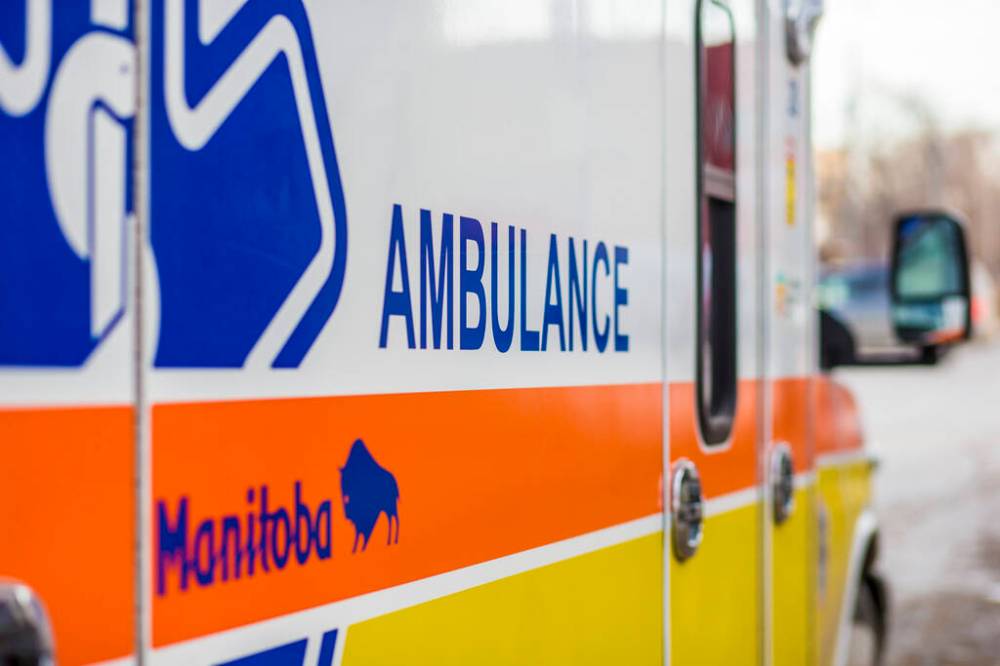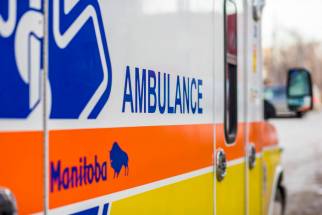New ambulance agreement urgently needed
Read this article for free:
or
Already have an account? Log in here »
To continue reading, please subscribe:
Monthly Digital Subscription
$0 for the first 4 weeks*
- Enjoy unlimited reading on winnipegfreepress.com
- Read the E-Edition, our digital replica newspaper
- Access News Break, our award-winning app
- Play interactive puzzles
*No charge for 4 weeks then price increases to the regular rate of $19.00 plus GST every four weeks. Offer available to new and qualified returning subscribers only. Cancel any time.
Monthly Digital Subscription
$4.75/week*
- Enjoy unlimited reading on winnipegfreepress.com
- Read the E-Edition, our digital replica newspaper
- Access News Break, our award-winning app
- Play interactive puzzles
*Billed as $19 plus GST every four weeks. Cancel any time.
To continue reading, please subscribe:
Add Free Press access to your Brandon Sun subscription for only an additional
$1 for the first 4 weeks*
*Your next subscription payment will increase by $1.00 and you will be charged $16.99 plus GST for four weeks. After four weeks, your payment will increase to $23.99 plus GST every four weeks.
Read unlimited articles for free today:
or
Already have an account? Log in here »
Hey there, time traveller!
This article was published 14/06/2022 (1272 days ago), so information in it may no longer be current.
Winnipeg’s ambulance service is a mess. There’s no other way to describe it, as response times continue to grow and a chronic shortage of staff and equipment is putting people’s lives and safety at risk.
Winnipeg Fire Paramedic Service Chief Christian Schmidt told the city’s protection and community services committee last week ambulance response times are approaching 15 minutes, well above the recommended time of nine minutes. First responders in fire trucks provide emergency care more quickly — an average of eight minutes, 47 seconds — under Winnipeg’s integrated fire-paramedic model.
However, the latter cannot transport patients to hospital. Patients who require hospital care must wait nearly 15 minutes on average for an ambulance transport. For some, that could be the difference between life and death.
The number of ambulance dispatches in Winnipeg increased 12 per cent from 2017 to 2020, yet the number of ambulances on the road has remained the same. In January, there were a total of 28 hours where no ambulances were available at all. That is dangerous and potentially life-threatening.

The problem: Winnipeg is short an estimated 10 ambulances, as well as the 11 paramedics required to staff each one, according to WFPS officials, who for years have been begging the province for more resources to meet the demands of a growing and aging population.
Ambulances have been a provincial responsibility since 1997 when regional health authorities took over the service from municipalities. In Winnipeg, paramedic services operate under a hybrid model in which Shared Health, a provincial agency, enters into service agreements with the city. WFPS operates the ambulances and the province is supposed to pay for them. However, provincial funding has not kept pace with growing costs and rising demand.
Incremental expenses, such as wage increases and overtime costs, often fall on the city. Like most shared funding arrangements between Manitoba’s Progressive Conservative government and city hall, it has caused strained relations and endless disagreements over who is responsible for which costs.
The Tories have focused on reducing ambulance fees paid by patients, but have shirked their responsibility on ensuring the system is adequately funded.
The Tories have focused on reducing ambulance fees paid by patients, but have shirked their responsibility on ensuring the system is adequately funded.
To make matters worse, the city has been without a service agreement with the province since 2017, when the last one expired. Since then, the city has received provincial funding on an ad-hoc basis through annual “funding letters,” which has intensified friction between the two levels of government.
Both Shared Health and the city have said contract negotiations are ongoing. However, there is no timeline and no assurance from the province that a new agreement will include sufficient resources to reduce response times.
A city administration report in February stated a preliminary contract “is currently moving through review processes” and could be “available for signing” by the end of March. That target date has come and gone. A Shared Health spokesperson said last Friday the agency is working to finalize a contract, but would not comment further, except to say that longer response times are a “concern” it shares with the WFPS.
A city administration report in February stated a preliminary contract “is currently moving through review processes” and could be “available for signing” by the end of March.
Meanwhile, response times continue to grow and Winnipeggers face an increasing risk of being denied an ambulance when they need one.
Ambulance services are a provincial responsibility. Paramedicine is an integral part of the province’s health care system. It is up to the Stefanson government to ensure Winnipeg has access to a reliable, high-quality paramedic service. That means finalizing a service agreement with the city and ensuring WFPS has the resources it needs. Failure to do so could have dire consequences.

History
Updated on Tuesday, June 14, 2022 9:43 PM CDT: Adds related item










